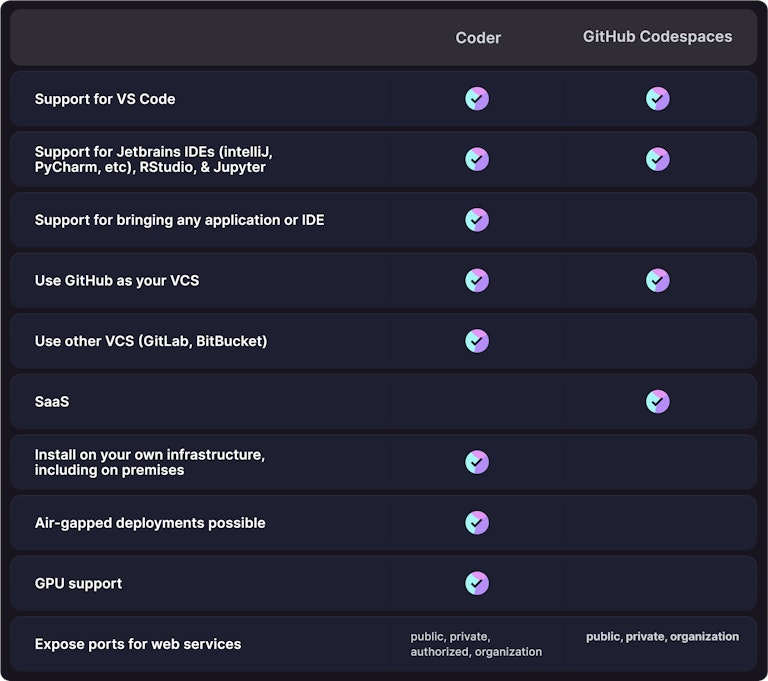Coder: The self-hosted GitHub Codespaces alternative


Update
The original article was written by Erik Bledsoe and Ashley McClelland. We’ve updated it to cover the latest details about GitHub Codespaces and Coder.
GitHub Codespaces and Coder both provide developers with reproducible, powerful, cloud-based developer environments or workspaces, but they differ dramatically in their approach to providing those environments and what tooling is available to the developer.
Here's how to choose the best fit for your development team.
Why remote developement
Today most developers have their IDEs on their local machines. There is a growing interest in moving development workspaces and IDEs to the cloud, which solves some key problems for organizations while also offering advantages for the developer:
start coding on day one — developers often spend hours or days setting up a development environment on a local machine before they can make their first commit. With cloud-based workspaces, fully configured workspaces are available for developers to start contributing immediately.
secure source code — individual devices remain the least secure endpoint in the software development pipeline. With local development, source code and data are cloned to individual workstations, creating security risks. With cloud-based workspaces, source code and data remain within the organization’s infrastructure.
less drift — dependency and configuration drift in the development environment results in broken environments and builds, i.e., the classic “it works on my machine” problem. Reproducible, cloud-based developer workspaces ensure that everyone is working with the same basic configuration.
greater compute power — cloud development eliminates the need to focus on local hardware. Need more processing power? Add more cores to your instance—or a GPU.
remote access — because development environments are in the cloud, developers can access them securely from wherever they are.
GitHub Codespaces: Easy to use, but limited in control
GitHub Codespaces is tightly integrated with the GitHub interface. That integration makes it incredibly simple to use, but also limits your options. Launching a Codespace is as easy as visiting a repository in your browser and clicking a button or pressing the period on your keyboard.
However, Codespaces can’t be used with any other repository other than GitHub.
If you and your team only use VS Code, and you only use GitHub, then GitHub Codespaces is probably your best solution.
Coder: Your infrastructure, your tools, your controls
If, however, your development team requires a multi-cloud strategy or you require an air-gapped development platform, then you should consider Coder.
Coder’s goal is to remove the obstacles that prevent developers from doing what they do best, writing code; our goal is not to lock you into a proprietary ecosystem. At Coder, we assume that you and your team know what editors work best for you, what cloud providers you want to use, what workflows are best for your team.
That’s why Coder takes an agnostic approach to the tools and platforms you use. Coder’s approach also gives you greater control over data and source code since it never needs to leave your infrastructure (depending upon your configurations). That’s why it is used by some of the most security-conscious organizations and companies in the world like investment banks, hedge funds, retailers, asset managers, IT services firms, software providers, energy, military, and the intelligence community.

Pricing
Codespaces billing is based on an hourly rate for actively running Codespaces with rates increased based upon the number of cores available to the Codespace. The hourly rate ranges from $0.18/hour for two cores up to $2.88/hour for a thirty-two-core Codespace. In addition, there is a $0.07/GB/month charge for storage. A developer using a 4 core Codespace for eight hours a day would cost $60.48 (not including storage) for a month assuming twenty-one working days.
Coder is billed per user/year. Contact Sales for more information. Because it is running on your own infrastructure you have to include the cloud computing cost in your total cost of ownership (TCO) calculation, but you retain complete control of that. This means organizations can take advantage of any current cloud provider discounts and keep the bill for all cloud usage in a single place. Additionally, Coder helps control cloud costs by allowing admins to automatically shut down inactive workspaces and limiting the number of resources that can be used by an individual workspace.
Customer Spotlight: Palantir
When Palantir needed a solution to standardize development environments, increase performance, and integrate with their cloud ecosystem, Coder was the answer.
Try Coder
If you would like to learn more about how Coder provides an alternative to GitHub Codespaces, request a demo or check out Coder OSS on GitHub, start a Coder Enterprise trial.
Subscribe to our newsletter
Want to stay up to date on all things Coder? Subscribe to our monthly newsletter and be the first to know when we release new things!


